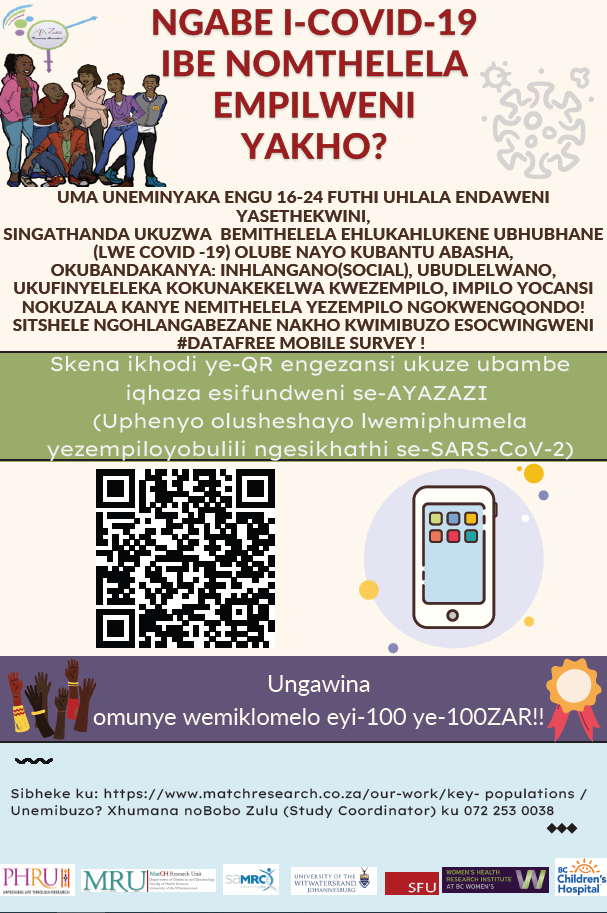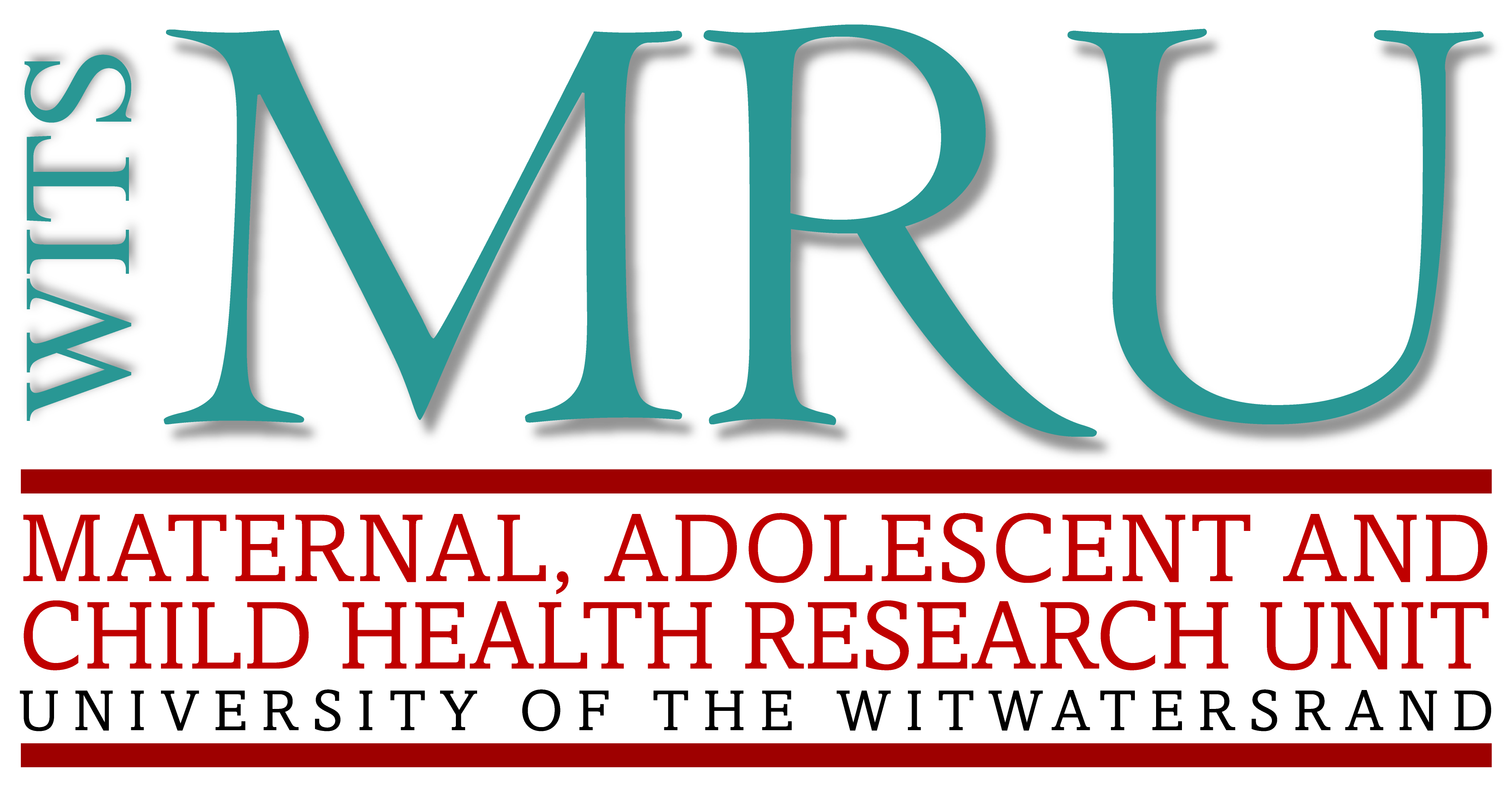Socio-behavioral Studies
Nursing Resilience
Study title | Developing a resiliency intervention to support nurses engaged in the provision of HIV care (Phase I) |
Study design | This study will adapt, refine, and pilot test an existing stress management and resiliency-enhancing intervention (the Relaxation Response Resiliency Program; 3RP) for nurses providing HIV care in the public sector in SA. We will identify the ways in which the 3RP requires adaptation to meet the needs of nurses based on data collected from focus group discussions (FGDs) and adapt the intervention accordingly. We will enroll N=15-21 nurses to participate in FGDs (up to 3 groups of 5-7 nurses). |
Funder | NIH – |
Principal investigators | Dr Christina Psaros – Massachusetts General Hospital, Prof Jenni Smit – Wits Maternal Adolescent and Child Health Research |
Site | EThekwini clinics providing HIV care |
AYAZAZI RIGHTS (Rapid Investigation of Gendered Health outcomes in the Time of SARS-CoV-2): Focusing on sexual and reproductive health among adolescents in South Africa.
This anonymous online data free mobile survey addresses knowledge gaps concerning adolescent experiences of COVID-19, public health responses and impacts on priority sexual, reproductive and mental health outcomes. Th study has two aims: (1) To measure adolescent attitudes towards, compliance with, and experiences (e.g., job loss) of COVID-19, public health and government responses (e.g., provision of social grants); (2) To assess the impacts of the COVID-19 response on key sexual, reproductive and mental health outcomes, including gender attitudes, beliefs and practices including gender-based violence, access to HIV testing, prevention (i.e. PrEP and condoms), and treatment services, contraceptive access, and experiences of depression and anxiety. The survey commenced in 2022 and aims to reach 2000 adolescents aged 16 – 24 in the eThekwini District, KZN.
Click here for list of resources

| Funder/Sponsor: | BC Children’s Hospital Foundation |
| Principal Investigator: | Dr Mags Beksinska (MRU), Angela Kaida |
| Site: | MRU, Durban |
SURVEY LINK: https://ars.datafree.co/AyazaziRightsSurvey


Socio-behavioral Completed Studies
SOAR project
This evaluation study will assess the effectiveness of a community-based HIV prevention program in informal settlements within KwaZulu-Natal—one of four provinces where the programme is being carried out. The Community Responses intervention is a multifaceted behaviour change intervention using an adapted and scaled version of Stepping Stones. The intervention is designed to promote uptake of HIV and SGBV support services, while also promoting equitable gender norms and a positive enabling environment. The programme targets young men and women living in informal settlements. The Project SOAR evaluation will address a series of important research questions, such as what are the key factors within the informal settlement context that lead to HIV risk behaviours, what level of exposure to an intervention is needed to improve key outcomes, and how to best scale up group education models such as Stepping Stones. Building the global evidence base in this area is vital to improving outcomes related to HIV prevention and eliminating harmful gender norms and SGBV, especially in informal settlements.
Our Research: The study uses a cluster stepped-wedge evaluation design whereby 18 clusters (communities) are randomized to when they initiate the CR intervention. A cohort of approximately 1500 men (aged 18–35) and women (aged 18–24) in evaluation communities will be followed over the course of approximately 30 months. Survey interviews will be completed at baseline and at three additional time points at 7-month intervals. In addition, we will conduct qualitative interviews with programme implementers and a selection of study participants to gain a deeper understanding of the process, experiences, challenges, and benefits of adapting and scaling up the Stepping Stones intervention.
Research Utilization: This study aims to influence the achievement of two key objectives of the South Africa’s National Strategic Plan on HIV—addressing social and structural drivers of HIV and reaching all vulnerable populations with comprehensive services and interventions. To ensure research utilization of findings, the study team continuously engages with key local stakeholders at all stages of the study from inception to dissemination of findings, including the HIV prevention unit of the Department of Health in KwaZulu-Natal Province and nationally; implementers of community-based HIV activities, such as Centre for Communication Impact; and researchers at universities and institutes.
Project SOAR is a five-year (September 2014–September 2019) cooperative agreement funded by the President’s Emergency Plan for AIDS Relief and the U. S. Agency for International Development (Agreement No. AID-OAA-A-14-00060). Population Council leads the Project SOAR consortium in collaboration with Avenir Health, Elizabeth Glaser Pediatric AIDS Foundation, the Johns Hopkins University, Palladium, and The University of North Carolina at Chapel Hill.
| Funder/Sponsor: | President’s Emergency Plan for AIDS Relief, U. S. Agency for International Development |
| Principal Investigator: | Dr. Julie Pulerwitz (Population Council), Site PI: Mags Beksinska |
| Site: | MatCH Research Commercial City Site and communities in central Durban and Ugu |
| Collaborators: | CCI (Centre for communication impact) |
IPM Socio Behavioural Study
In-depth interviews were also conducted in the IPM 032 study across 4 research centres in South Africa and Uganda, looking at cases of special interest (including non-adherent ring users, participants who fell pregnant or seroconverted during the study.
| Funder/Sponsor: | International Partnership for Microbicides (IPM) |
| Principal Investigator: | Prof J Smit (MatCH Research Unit) |
| Site: | MatCH Research main office |
DIFFER: Diagonal Interventions to Fast-Forward Enhanced Reproductive Health
| Funder/Sponsor: | The European Union |
| Principal Investigator: | Prof J Smit (MatCH Research) |
| Site: | MatCH Research Commercial City Site and community in central Durban |
| Collaborators: | University of Ghent – International Centre for Reproductive Health (UG-ICRH), Belgium, Ashodaya Samithi (Ashodaya), India, International Centre for Reproductive Health Association, Kenya (ICRH-K), International Centre for Reproductive Health Association Mozambique (ICRH-M), Lifeline, Durban |
Safer conception for HIV-infected men choosing to Conceive with At-Risk-Partners: Helping Men Have Healthy Babies (Piloting the intervention)
The study is currently in the planning phase and we are working on Phase 2, an Open Pilot study of the safer conception intervention. In Phase 3 we will conduct a pilot randomised controlled trial of the final safer conception intervention among men who want to have children with uninfected or unknown status partners.
| Funder/Sponsors: | National Institutes of Health via Massachusetts General Hospital |
| Principal Investigators: | Dr L Matthews (Massachusetts General Hospital ), Prof J Smit (MatCH Research) |
| Site: | Durban Clinic |
